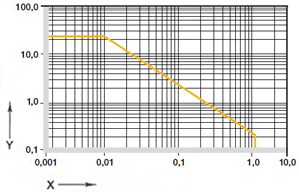The development of the iglidur® R as a bearing material focused on high performance and very low cost. Especially in the dry operation low coefficients of friction and wear were to be attained. The PTFE- and silicon-free material achieves extremely low coefficients of friction in dry operation and runs largely free of stick-slip effects.
iglidur® R - Material data
| General features | Unit | iglidur® R | test method |
| Density | g/cm³ | 1,39 | |
| Colour | Dark red | ||
| Max. humidity absorption at 23°C/50% R. H. | % weight | 0,2 | DIN 53495 |
| Max. water absorption | % weight | 1,1 | |
| Coefficient of surface friction, dynamic, against steel | µ | 0,09 - 0,25 | |
| PV values max. (dry) | MPa x m/s | 0,27 | |
Mechanical properties |
|||
| Bending E-module | MPa | 1.950 | DIN 53457 |
| Tensile strength at +20 °C | MPa | 70 | DIN 53452 |
| compressive strength | MPa | 68 | |
| Maximum recommended surface pressure (20° C) | MPa | 23 | |
| Shore D hardness | 77 | DIN 53505 | |
Physical and thermal properties |
|||
| Max. long term application temperature | °C | +90 | |
| Max. short term application temperature | °C | +110 | |
| Lower application temperature | °C | -50 | |
| Heat conductivity | [W/m x K] | 0,25 | ASTM C 177 |
| Coefficient of thermal expansion (at 23° C) | [K-1 x 10-5] | 11 | DIN 53752 |
Electrical properties |
|||
| Specific forward resistance | Ωcm | > 1012 | DIN IEC 93 |
| Surface resistance | Ω | > 1012 | DIN 53482 |
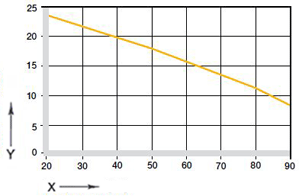
Figure 02: Maximum recommended surface pressure dependent on the temperature (23 MPa to +20 °C)
X = Temperature [°C]
Y = Load [MPa]
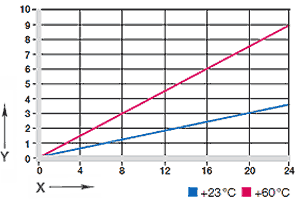
Figure 03: Deformation under load and temperatures
X = Load [MPa]
Y = Deformation [m/s]
Maximum recommended surface pressure represents a mechanical material parameter. Tribological conclusions cannot be drawn from it. With increasing temperatures, the compressive strength of iglidur® R plain bearings decreases. Fig. 02 clarifies this connection.
Figure 03 shows the elastic deformation of iglidur® R with radial loads. Under the maximum permitted load of 23 MPa, the deformation amounts to 4%. A plastic deformation can be negligible up to this value. It is however also dependent on the period of exposure.
| m/s | Rotary | oscillating | Linear |
| Constant | 0,8 | 0,6 | 3,5 |
| Short-term | 1,2 | 1 | 5 |
Table 02: Maximum surface speeds
iglidur® R bearings are suitable for high surface speeds. Speeds of up to 10 m/s are permitted in linear motions! Here too the specified maximum values can be achieved only with minimum pressure loads. The specified values show the speed at which due to friction an increase in temperature up to the long-term permitted value can occur.
| iglidur® R | Operating temperature |
| Lower | - 50 °C |
| Upper, long-term | + 90 °C |
| Upper, short-term | + 110 °C |
| Secure axially in addition | + 50 °C |
Table 03: Temperature limits for iglidur® R
With increasing temperatures, the compressive strength of iglidur® R plain bearings decreases. Fig. 02 clarifies this connection. The temperatures prevailing in the bearing system also have an influence on the bearing wear. An additional securing is recommended at temperatures higher than +50°C.
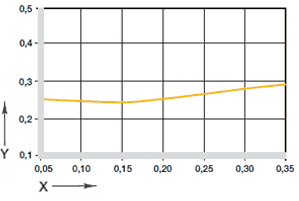
Figure 04: Coefficients of friction dependent on the surface speed, p = 0,75 MPa
X = Surface speed [m/s]
Y = Coefficient of friction μ
The coefficient of friction declines like the wear resistance with increasing load. iglidur® R is suitable for applications in which high pv values are induced mainly through the high surface speed and not as much through the surface pressure. Less distinct is the dependency of the coefficient of friction of the iglidur® R bearings on the shaft surface.
| iglidur® R | Dry | Grease | Oil | Water |
| Coefficients of friction µ | 0,09 - 0,25 | 0,09 | 0,04 | 0,04 |
Table 04: Coefficients of friction for iglidur® R against steel (Ra = 1 μm, 50 HRC)
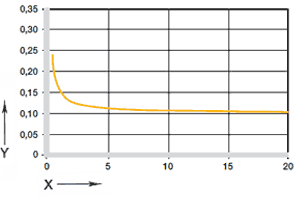
Figure 05: Coefficients of friction dependent on the load, v = 0.01 m/s
X = Load [MPa]
Y = Coefficient of friction μ
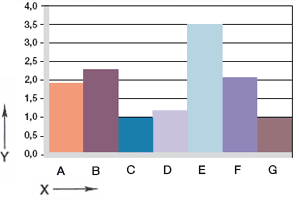
Fig. 06: Wear, rotating application with different shaft materials, load p = 1 MPa, v = 0.3 m/s
X = Shaft material
Y = Wear [μm/km]
A = Aluminum, hard-anodized
B = machining steel
C = Cf53
D = Cf53, hard chrome-plated
E = St37
F = V2A
G = X90
Figures 06 and 07 display a summary of the results of tests with different shaft materials conducted with bearings made of iglidur® R. At 0.3m/s and 1 MPa, the X90 and Cf53 shafts are the best gliding partners. With increasing loads the iglidur® R bearings feature the best wear behavior with CF53 and V2A shafts. In pivoting application, the hard-chromed shaft proves to be the ideal partner.
Please contact us in case the shaft material scheduled by you is not included here.
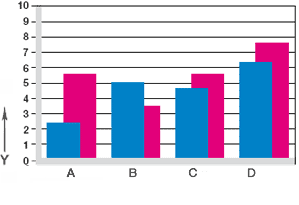
Fig. 07: Wear in swivelling and oscillating applications at constant load with various shaft materials, p = 2 MPa
X = Load [MPa]
Y = Wear [μm/km]
A = Cf53
B = hard chrome-plated
C = V2A
D = St37
pink = rotating
blue = oscillating
| Medium | Resistance |
| Alcohols | + |
| Hydrocarbons | + |
| Fats, oils, without additives | + |
| Fuels | + |
| Diluted acids | 0 to - |
| Strong acids | - |
| Diluted bases | + |
| Strong bases | + to 0 |
Table 05: Chemical resistance of iglidur® R
Electrical properties
| Specific forward resistance | > 1012 Ωcm |
| Surface resistance | > 1012 Ω |
iglidur® R bearings can be used under various environmental conditions and in contact with numerous chemicals. Table 05 gives an overview of the chemical resistance of iglidur® R bearings at room temperature.
iglidur® R bearings are radiation resistant up to a radioactive intensity of 3 x 10² Gy.
iglidur® R bearings are resistant to UV radiation, but the tribological properties deteriorate with continuous exposure.
In vacuum, iglidur® R degases. The use in vacuum is possible only limitedly.
iglidur® R bearings are electrically insulating.
The humidity absorption of iglidur® R bearings amounts to about 0.2 Wt.-% in standard climatic conditions. The saturation limit in water is 1.1 %. This should be considered according to the application conditions.
| Maximum moisture absorption | |
|---|---|
| at +23°C/50% r.F. | 0,2 weight-% |
| Max. water absorption | 1,1 Wt.- % |
Table 06: humidity absorption of iglidur® R
| Diameter
d1 [mm] | Shaft h9
[mm] | iglidur® R
E10 [mm] | Housing H7
[mm] |
| Up to 3 | 0 - 0,025 | +0,014 +0,054 | 0 +0,010 |
| > 3 to 6 | 0 - 0,030 | +0,020 +0,068 | 0 +0,012 |
| > 6 to 10 | 0 - 0,036 | +0,025 +0,083 | 0 +0,015 |
| > 10 to 18 | 0 - 0,043 | +0,032 +0,102 | 0 +0,018 |
| > 18 to 30 | 0 - 0,052 | +0,040 +0,124 | 0 +0,021 |
| > 30 to 50 | 0 - 0,062 | +0,050 +0,150 | 0 +0,025 |
| > 50 to 80 | 0 - 0,074 | +0,060 +0,180 | 0 +0,030 |
| > 80 to 120 | 0 - 0,087 | +0,072 +0,212 | 0 +0,035 |
| > 120 to 180 | 0 - 0,100 | +0,085 +0,245 | 0 +0,040 |
Table 07: Important tolerances for iglidur® R bearings according to ISO 3547-1 after the press-fit.
iglidur® R bearings are standard bearings for shafts with h-tolerance (recommended minimum h9). The bearings are designed for press-fit in a housing with h7 tolerance. After the installation in a housing with nominal diameter, the inner diameter of the bearing automatically adjusts to the E10 tolerance. In certain dimensions the tolerance in dependence on the wall thickness deviates from this (See delivery program )
More than 100,000 products available! Delivery and consultation Mon-Fri from 7am-8pm and Sat from 8am-12pm!
